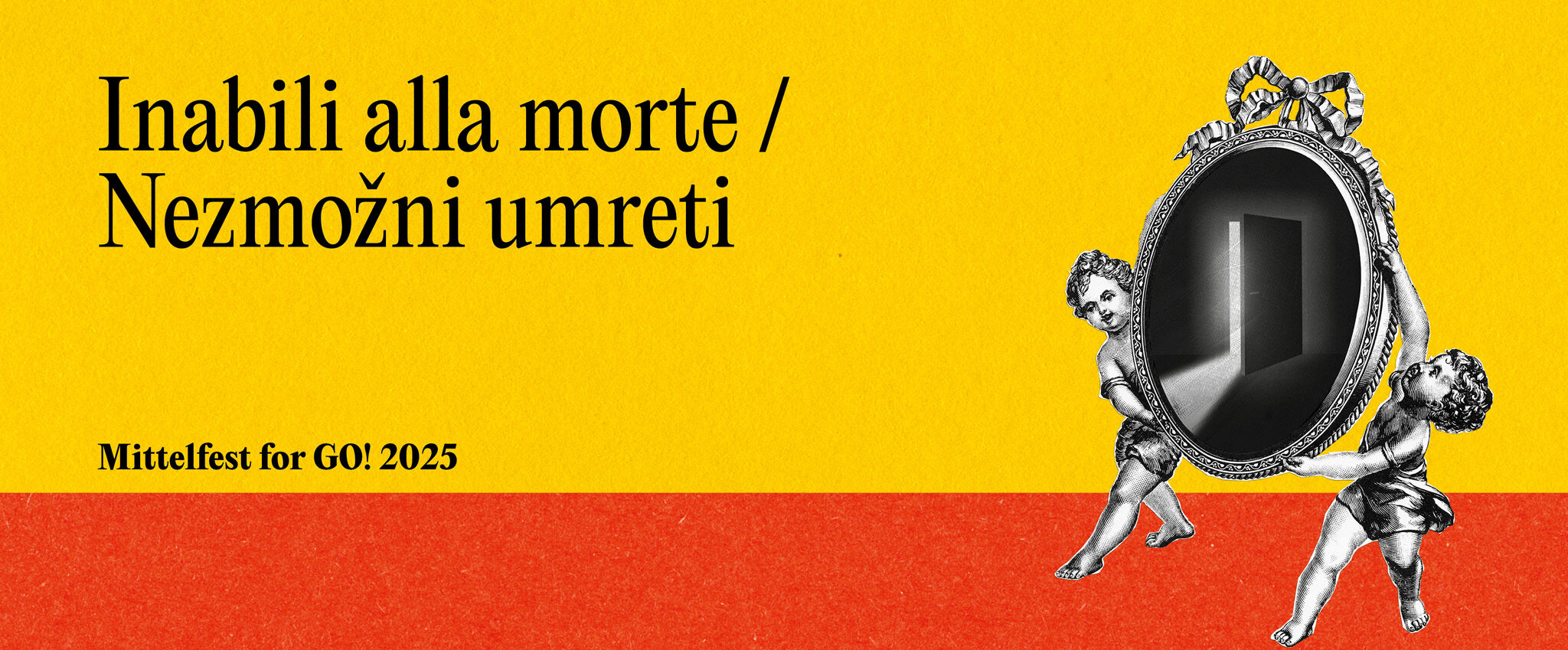Inabili alla morte / Nezmožni umreti

commissioned by Regione FVG
supported by GO! 2025
production Mittelfest
co-production SNG Nova Gorica
media partner Rai Radio3, Rai FVG, Radio Slovenija-Program Ars
he finding of the enrolment commission was irrevocable. He said: “Judged unable to death.”
Joseph Roth, The Emperor’s Tomb
Indeed, a discrepancy that comes to mind when remembering 1989 is the one between history and fantasy. […] We really didn’t know what to expect, but we knew what we wanted: glitter and glamour, like on the other side, in the West.
Slavenka Drakulić, Café Europa Revisited
1938. The journalist and writer Joseph Roth, born and raised under the reign of Emperor Franz-Joseph I, publishes the second and more refined part of his own familiar saga about Trotta von Sipolje, Slovenians became nobles recently: La Cripta dei Capuccini (The Emperor’s Tomb). Through the eyes of the youngest (dilapidator and joyful) member of the Trotta’s – and together with a gallery of characters of cousins, mothers, wives, adventurers, boasters, soldiers, and deciduous nobles from the Adriatic Sea to Galicia, plus a son sent to the distant Paris – takes place the story of crushing of the empire and the Habsburg myth. Vienna fin de siècle gives way to the illusions of the First world war, to the lively and dangerous chaos after it and to the riots of the great Twentieth century dreams: the imperial capital slowly disappears, swallowed by the Twentieth century whirlpool, even before Nazism.
What will happen later to Trotta and his family: will they be also swallow by the History, or will they continue to survive or fight against it, generation after generation, like everybody of us? What will happen to the dream of the former multinational and multicultural Empire, inside the Europe divided by the Iron curtain? The Trotta von Sipolje are destined, as many people of the Old continent, to eclipse themselves, giving way to the rampant people beyond the Atlantic, to the American champions of the last century? Or, despite the proclamations of sunset that have been condemning Europeans for over a hundred years, the Trotta will also end up being here, more than surviving two World wars and a “cold” one lasting fifty years, because they are precisely “unable to death”?
Inabili alla morte/Nezmožni umreti, created and directed by Giacomo Pedini, will tell the Trotta’s story, era after era, and with them the history of centre Europe with three different shows and literary compositions: La Cripta dei Capuccini (The Emperor’s Tomb) by Joseph Roth, V iskanju izgubljenega jezika (In the search of the lost language, temporary title), L’alba dopo la fine della storia (The dawn after the end of history, temporary title).
The first story tells the dissolution of Habsburgian world, the second – set in the Fifties and Sixties – will be about the Europe of the Iron curtains and walls, and the third – set between the Eighties and the Nineties – will tell the Europe of dreams and lives in front of the fall of walls and the opening of new roads. The three texts would later turn into three radio dramas (both in Italian and Slovenian) and a book (both in Italian and Slovenian)
The theme, the places and the history evoked will also turn into an ad hoc made video-documentary, which follows in the footsteps of this semi-unknown Europe between East and West, “unfit for death”.
The project
Performances
La Cripta dei Cappuccini (The Emperor’s Tomb) by Joseph Roth
Teatro Verdi in Gorizia, preview (for under 26) 10 May 2024, premiere 11 May 2024 (at 20.45)
production Mittelfest
Other performances already scheduled: Gorizia, 13-14 September2025
Cercando la lingua perduta (In the search of the lost language, working title) by Goran Vojnović
SNG Nova Gorica, premiere 14 November 2024
directed by Janusz Kica
production SNG Nova Gorica
Other performances already scheduled: Nova Gorica, mid-September 2025
L’alba dopo la fine della storia (The dawn after the end of history, working title) by Paolo Di Paolo
Teatro Verdi in Gorizia, premiere 20-21 September 2025
production Mittelfest
Radio programming
La Cripta dei Cappuccini (The Emperor’s Tomb) May-June 2024 Italian version, November 2024 Slovenian version
Cercando la lingua perduta (In the search of the lost language) spring 2025 Italian and Slovenian version
L’alba dopo la fine della storia (Dawn after the end of history) September 2025 Italian and Slovenian version
The Italian radio versions are a co-production Mittelfest with Rai FVG for Rai Radio3
The Slovenian radio versions are a co-production Mittelfest with SNG Nova Gorica and Radio Slovenija – Program Ars

